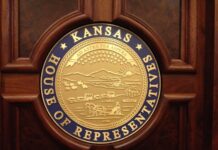It’s an issue that’s been percolating behind the scenes for a couple years.
It’s been generally accepted that the Legislature needs a supermajority to ask Congress to call a convention of states for proposing amendments to the U.S. Constitution.
The two-thirds requirement, after all, is written into the state constitution.
But Senate President Ty Masterson is expected to put that to the test Wednesday when the Senate takes up a proposal asking Congress to call a convention of states to place limits on the federal government.
Masterson on Tuesday told Senate Republicans that he plans to declare the resolution passed even if it gets a simple majority but fails to make the two-thirds requirement established by the state constitution.
The goal, Masterson said, is to resolve questions raised by a 2019 attorney general’s opinion suggesting the constitutional provision is essentially an expression of the will of the people of Kansas and isn’t binding, even though it’s in the state constitution.
The attorney general’s opinion suggests the Legislature could change its rules and pass the legislation with a simple majority.
The current House rules require a two-thirds majority to seek a convention, while the Senate rules don’t address the number of votes needed to pass the bill.
The attorney general’s opinion noted that Senate Rule 35 omits explicit reference to a concurrent resolution to call a convention for proposing amendments to the constitution
“The Kansas Legislature may determine for itself the number of affirmative votes required to exercise the federally delegated power to ratify a proposed amendment to the United States Constitution or apply for Congress to call a federal constitutional convention,” the opinion said.
“The effect of the supermajority requirement is merely precatory, or in other words an expression by the people of Kansas of their desire that the Legislature muster a two-thirds vote in each house to ratify federal constitutional amendments or apply for Congress to call a convention for proposing federal constitutional amendments,” the attorney general’s office wrote.
By declaring the resolution passed – assuming that it receives 21 votes – it sets the stage for a legal challenge to resolve questions about how many votes does it take to pass a resolution asking for a convention.
“I do want an answer to the question that’s been around for decades of whether or not there is truly conflict,” Masterson said.
“Some contend there’s absolute conflict, some think there isn’t a conflict,” he said. “I just want an answer to that question.”
If the resolution comes up somewhere between 21 an 27 votes, Masterson said he would read a statement declaring it adopted and “we’ll see it where it goes from there.”
Masterson said he’s assuming that someone who feels as though they’re an aggrieved party by not getting it passed will bring a lawsuit.
Republican Sen. Richard Hilderbrand opposes the maneuver because it violates the state constitution.
“We took an oath to uphold the Kansas Constitution as well as the U.S. Constitution,” Hilderbrand said.
Hiderbrand questioned the motives of the Convention of States group, which is urging the Senate to pass the bill with a simple majority.
“My problem is you have an organization that is championing that our court system is corrupt, that they’re broken and they are the root of all problems in our nation,” Hilderbrand said.
“They are going to use that same corrupt, broken court system to violate our Kansas Constitution in order for them to move forward in the state of Kansas,” he said.
The proposal drew some blowback from Senate Republicans such as Sen. Dennis Pyle, who questioned how much the lawsuit would cost taxpayers.
In 1974, Kansans voted to amend the constitution to require two-thirds of the Legislature to ratify any amendment to the U.S. Constitution or to ask for a constitutional convention.
But the attorney general’s opinion said the Legislature is bound by the two-thirds vote requirement by the rules it adopted and not the state constitution.
“The supermajority vote requirement to apply for Congress to call a federal constitutional convention in…the Kansas Constitution is precatory language,” the office wrote.
“We likewise conclude the Legislature may adopt rules requiring a two-thirds vote to apply for Congress to call a federal constitutional convention,” the opinion stated.
Article V of the U.S. Constitution provides for amending the document, including calling for a convention of states to propose amendments.
The attorney general’s opinion notes that Article V does not explicitly authorize or forbid a state from adopting specific requirements for ratifying a constitutional amendment.
The U.S. Supreme Court found in 1922 that because the state’s ratification power comes from the federal constitution, it “transcends any limitations sought to be imposed by the people of a state including limitations in a state’s constitution.”
The attorney general said that only one court has reviewed a state constitution’s supermajority requirement for ratification of a federal constitutional amendment.
That opinion addressed but did not rule on the constitutionality of the supermajority requirement imposed by the Illinois Constitution, noting only that each chamber of the legislature could decide whether to adopt the three-fifths requirement imposed by that state’s constitution.
The resolution is about the same as one that was considered in the state Senate in 2018.
Three years ago, the resoluton came up five votes short of the 27 needed for passage in the Senate. It didn’t get a vote in the House in 2018.
A similar resolution in 2016 passed 77-47 in the House, but it was seven votes short of the two-thirds majority required by the constitution.
Convention of States Action called on the Senate to pass the bill with a simple majority.
“Kansans are great American patriots and understand that their legislators are, too,” Convention of States Action President Mark Meckler said in a statement.
“The 1974 Kansas state constitutional amendment to require a two-thirds vote to call a convention of states was slipped in without debate and was included in order to protect the recently issued Supreme Court decision, Roe v. Wade,” he said.
“We commend Sen. Masterson and the rest of the Kansas Senate for their clear understanding of their duties, and for standing up to those who would prefer that they ignore the U.S. Constitution and instead cower in fear while the country crumbles around them.”
















